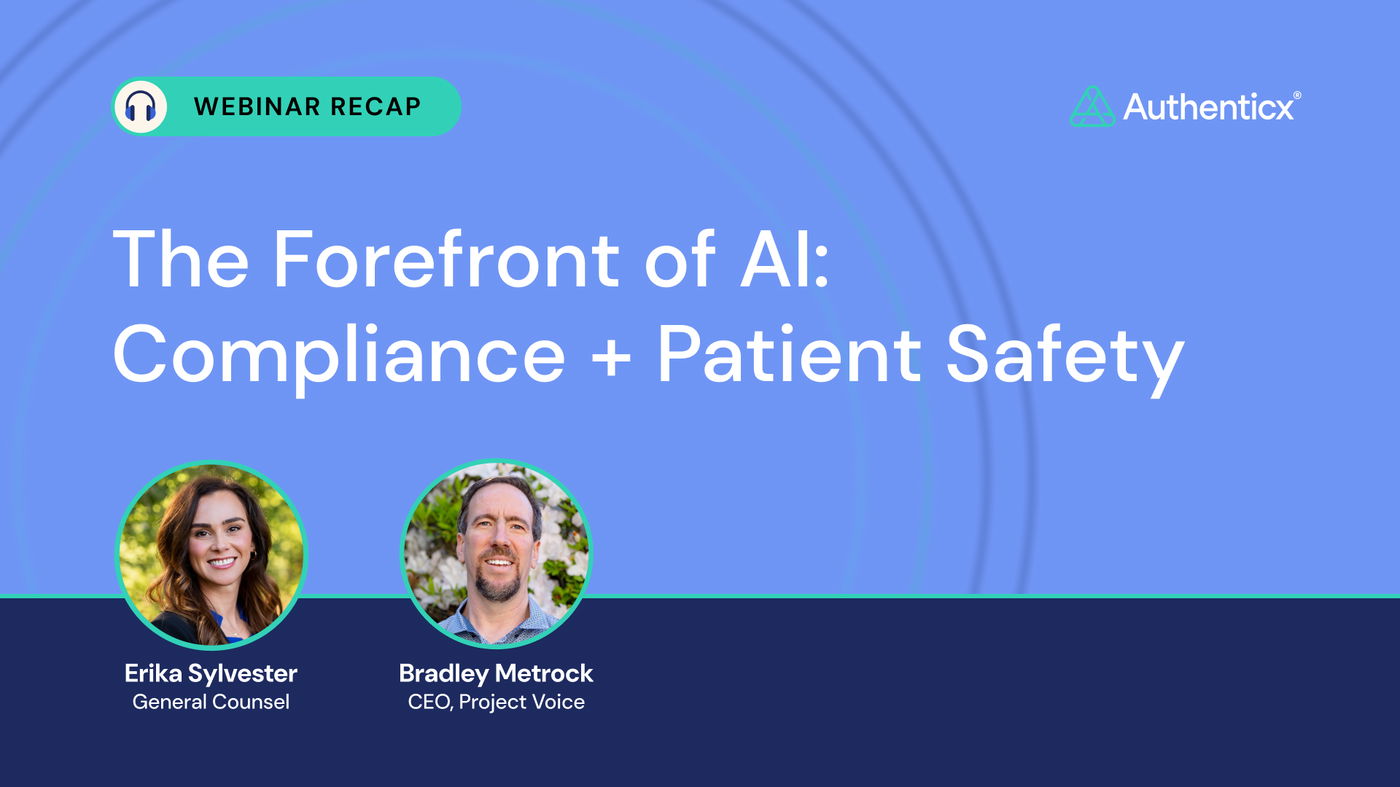
The role of artificial intelligence (AI) in healthcare is transforming. The desire for AI use in administrative tools and therapy methods is being counterbalanced by new, state-by-state laws and calls for more transparency. But any technology adoption comes with risk, namely in healthcare, where innovation must be considered alongside patient safety and compliance efforts.
Authenticx General Counsel and Head of Compliance Erika Sylvester and Project Voice CEO & PVCP General Partner Bradley Metrock discuss the developing AI regulatory landscape and its impact on the healthcare industry.
Given the pace of change and evolution of AI regulation and technology, please note that this content was shared on August 13, 2025, and it should not be viewed as evergreen. We urge you to keep up to date on AI regulations.
Watch the webinar recording here.
Key Takeaways:
- More states are making movements to enact (or have already enacted) laws on AI with a focus on transparency, high-risk use cases, deepfake protections, and human accountability.
- The FDA has rolled out proposed AI guidelines for the healthcare industry.
- U.S. AI regulations are still evolving, so it is important to keep a pulse on updates.
How are these shifts in both the global and U.S. landscapes affecting your operations, compliance strategy, and ultimate goal of patient safety? Let’s dive in.
AI Regulation Today
Although the United States has no federal law that has been passed to establish broad regulations or prohibitions on the development or use of AI at the federal level, many states have introduced legislation on the topic of AI, and there are some industry-specific guidelines being established.
State and Federal Perspectives
The surge of AI legislation in the United States is real, and it is affecting how businesses operate—including healthcare. Looking year-over-year, the sheer amount of bills enacted has exponentially increased on a state level:
- 2023: 191 bills
- 2024: 693 bills
- 2025: 780 bills (and counting)
With nearly 1,600 bills introduced in just three (3) years, it proves that not only is AI moving at an extremely accelerated pace, but the lawmakers are trying to keep up.
California and Utah are among the states that have passed several bills into laws, each of them with five or more (5+) laws currently in place. Recently, Illinois signed a law into place to ban the use of AI in mental health therapy, joining several other states doing the same. But what are some trends of the state-level bills?
- Transparency
- High-risk use oversight
- Deepfake protections
- Human accountability (rather than the technology itself)
Ultimately, there will be variability among state laws based on what each legislator believes to be the most important aspects of AI to legislate. For this reason, examining common, well-intended, compliant practices that vendors proactively apply is critical to future-proofing your investment. At Authenticx, AI governance is a crucial component of what we do. Our internal principles serve as a foundation to guide our mission of providing reliable AI to our partners.
The Federal AI Approach
While the U.S. gives power to the states to enact laws by means of the Tenth Amendment of the United States, it has introduced an AI Action Plan. The two main focuses of this plan are:
- Eliminating regulatory barriers that could “burden innovation”
- As stated above, this rescinded the 2023 Executive Order (“AI Risk, Bias, Transparency”)
- It discourages state-level AI regulation by threatening grant reduction
- It retools agencies to promote interpretability and open-source AI (such as NIST) by removing references to topics, like DEI and climate.
- Ensuring the United States is a global leader in AI through:
- Infrastructure
- Export strategy
- International AI diplomacy and security
FDA Guidelines and Compliance Themes
The industry is also coming to the table with potential guidelines and requirements. At the start of 2025, the FDA released its proposed guidelines for AI and AI in healthcare:
- Guidance for AI developers and the healthcare industry as a whole.
- Public health protection and ensuring AI models are trustworthy enough for decision-making.
- Guidelines are subject to finalization.
FDA Compliance Themes
The core compliance themes focus on risk assessments on decision consequence and model influence, data quality, and the continued monitoring of the AI model’s outputs to maintain trust. Let’s understand this a bit deeper:
- When it comes to assessing risk, two (2) questions every developer and company must ask are: What is the potential impact on a patient? How much do we rely on AI for final decisions?
- For data quality, you must check three (3) boxes:
- Use the principle of “garbage in, garbage out”—a principle we actively apply at Authenticx for all of our AI—if the model is trained on high-quality data, you’re getting a high-quality, reliable, and representative result.
- Data must be complete, accurate, and representative of your diverse patient population—this is a sticking point with solicited feedback data, like surveys, which only measure who responds—unlike the use of unsolicited feedback data via patient interactions that flow through your call center every single day.
- Work to find and reduce algorithmic bias, and this is not a one-time review—this is a consistent action to ensure an accurate output reflective of the full population.
Monitoring and maintaining AI models means that AI models should not be left to the mantra of “set it and forget it.” They take constant work, which is why at Authenticx, we employ a human-in-the-loop (HITL) approach. Managing AI with our team allows us to manage or prevent “model drift” and any degradation of AI over time. Lastly, reflecting the state-level approach, you must be transparent and ready to explain the AI.
Authenticx and Patient Safety
Authenticx has developed a solution to automate the detection and escalation of conversations that contain an adverse event. Our models are purpose-built for healthcare and continuously trained by in-house analysts, rather than relying on call center scripts alone, to accurately and reliably identify potential adverse and safety events, including product quality complaints and special situations.
The Authenticx Safety Event Solution features workflow automations and streamlined adverse event review and escalation to ensure compliance and support patient safety.
Interested in seeing the Authenticx Compliance Solution in action? Request a demo.

About Authenticx
Authenticx helps solve the unique problems in healthcare, automating manually intensive and error-prone processes to eliminate risk and improve patient safety. Request a demo to see our Safety Event Solution to see how we can help you save time, money, and limit your risk exposure with automated compliance solutions.
Want to learn more? Contact us!
Or connect with us on social! LinkedIn | Facebook | Instagram | YouTube


